

Let's Talk About Thin Privilege. I am five-foot-four, 125 pounds.
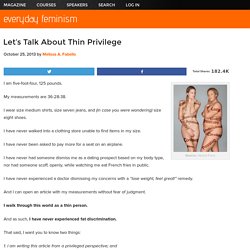
My measurements are 36-28-38. I wear size medium shirts, size seven jeans, and (in case you were wondering) size eight shoes. I have never walked into a clothing store unable to find items in my size. I have never been asked to pay more for a seat on an airplane. I have never had someone dismiss me as a dating prospect based on my body type, nor had someone scoff, openly, while watching me eat French fries in public.
I have never experienced a doctor dismissing my concerns with a “lose weight, feel great!” And I can open an article with my measurements without fear of judgment. Fat shaming. It’s a thing. - Sociological Images. According to Nicole Arbout’s youtube video “Dear Fat People,” fat people deserve to be ridiculed and treated poorly.
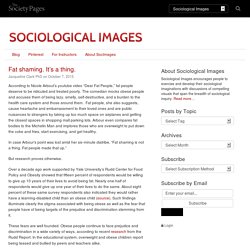
The comedian mocks obese people and accuses them of being lazy, smelly, self-destructive, and a burden to the health care system and those around them. Fat people, she also suggests, cause heartache and embarrassment to their loved ones and are public nuisances to strangers by taking up too much space on airplanes and getting the closest spaces in shopping mall parking lots. Arbour even compares fat bodies to the Michelin Man and implores those who are overweight to put down the coke and fries, start exercising, and get healthy.
In case Arbour’s point was lost amid her six-minute diatribe, “Fat shaming is not a thing. Fat people made that up.” But research proves otherwise. These fears are well founded. Obesity also has consequences in the workplace. Overweight and obese people should not expect to find respite from the health care system either. Let's Talk About Thin Privilege. 22 Examples of Thin Privilege. A Thought Provoking Campaign That Represents People With Disabilities. 9 Facts That Shatter Bullsh*t Stereotypes About Fat People. ‘Thigh Gap’: Reflections On Teenage Girls’ Latest Obsession. By Sylvia Pagan Westphal Guest Contributor A few weeks ago, my 13-year-old daughter brought up the issue of the “thigh gap.”
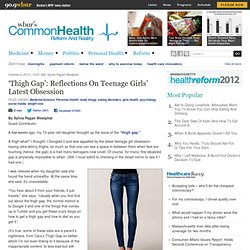
A thigh-what? I thought. I Googled it and was appalled by the latest teenage girl obsession: having ultra-skinny thighs, so much so that one can see a space in between them when feet are touching (hence, the gap) is a trait many teenagers now covet. Of course, for many, this idealized gap is physically impossible to attain. Topgold/flickr, creative commons I was relieved when my daughter said she found the trend unhealthy. “You hear about it from your friends, it just travels,” she says. (It’s true, some of these sites are a parent’s nightmare, from Cara’s Thigh Gap on twitter, which I’m not even linking to it because of the inappropriate content, to less-bad-but-still-troubling Operation Thigh Gap.
It’s a tough world out there for our teens. The pressure to be thin is nothing new. David Berreby – The obesity era. Years ago, after a plane trip spent reading Fyodor Dostoyevsky’s Notes from the Underground and Weight Watchers magazine, Woody Allen melded the two experiences into a single essay.
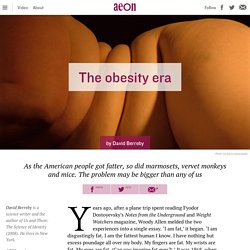
‘I am fat,’ it began. ‘I am disgustingly fat. I am the fattest human I know. I have nothing but excess poundage all over my body. My fingers are fat. That, as we used to say during my Californian adolescence, was then. And so the authorities tell us, ever more loudly, that we are fat — disgustingly, world-threateningly fat. Moral panic about the depravity of the heavy has seeped into many aspects of life, confusing even the erudite. Several governments now sponsor jauntily named pro-exercise programmes such as Let’s Move! Hand-in-glove with the authorities that promote self-scrutiny are the businesses that sell it, in the form of weight-loss foods, medicines, services, surgeries and new technologies. Higher levels of female obesity correlated with higher levels of gender inequality in each nation Biology. Big deal: You can be fat and fit. An activist at a National Association to Advance Fat Acceptance rally in New York wears a T-shirt to promote self-image.
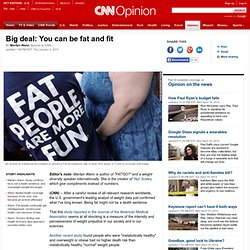
Marilyn Wann: Study confirms fat is not a death sentence, and overweight people live longerWann denied health coverage because of her size; she became an activist afterwardWann: Fat people continually get misdiagnosed, receive poor health care because of biasWann: Doctors finding new Health At Every Size approach provides better care Editor's note: Marilyn Wann is author of "FAT! SO? " and a weight diversity speaker internationally. She is the creator of Yay! (CNN) -- After a careful review of all relevant research worldwide, the U.S. government's leading analyst of weight data just confirmed what I've long known: Being fat might not be a death sentence. That this study reported in the Journal of the American Medical Association seems at all shocking is a measure of the intensity and pervasiveness of weight prejudice in our society and in our sciences.